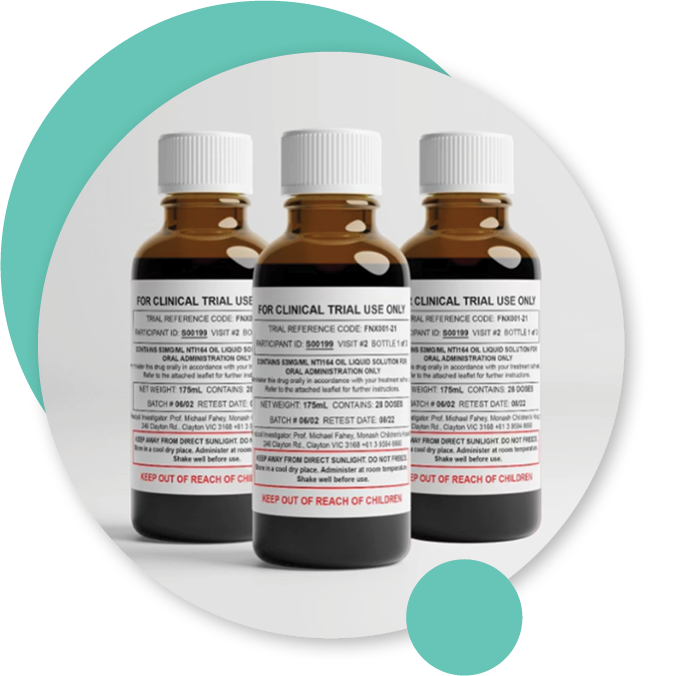
Neurotech International is conducting clinical studies to assess the neuro-protective, anti-inflammatory and neuro-modulatory activities of our proprietary NTI/Dolce cannabis strains.

Ground-breaking NTI164 treatment to improve quality of life.
Neurotech’s leading treatment, NTI164 is providing solutions for the treatment of conditions that improve quality of life. Our current development program is a world-first clinical trial using NTI164 to treat Paediatric Autism Spectrum Disorder (ASD) at Monash Children’s Hospital, Melbourne.
Phase I/II trial results demonstrated successful outcomes relating to the safety, tolerability and efficacy of NTI164 on key behavioural parameters with 93% of participants showing symptom improvement.
NTI164
- High level of CBDA + an assortment of other minor cannabinoids.
- This unique combination works differently to CBD- it has powerful effects on inflammatory pathways and suppress cytokine activity. It also contains less than 0.3% THC.
- The unique combination of CBDA and other ‘minor’ cannabinoids work together to create an “entourage effect” that is more potent than CBD isolate.
- Multi-functional mode of action – neuro-protection, neuro-modulation and neuro-regulation.
NTI164 Phase I/II Trials
The Program
First in human Phase I/II ASD paediatric study (S8)
Commenced in May 2021 at Monash Children’s Hospital led by A/Prof. Michael Fahey
Open label – single group
20 patients from 8 to 17yo, Level II and III Autism Spectrum Disorder
Dose regime assessments
5mg/kg, 10mg/kg, 15mg/kg and 20mg/kg
2,250 Assessment points
Parameters Anxiety, Participation, Irritability, Hyperactivity, Mood and Self-stimulation
Outcomes
93% of patients showed improvement
Global Improvement
64% of patients “much improved”
29% of patients “minimally improved”
7% of patients “no change”
Therapeutic Effect (Efficacy Index)
2 patients Therapeutic Index Score of 2
Vast Improvement complete or near remission of all symptoms
10 patients Therapeutic Index Score of 5 & 6
Decided improvement – Partial remission of symptoms
No “washout” period
Due to the positive therapeutic effects of NTI164 combined with feedback from parents and clinicians
NTI164 measures favourably when compared to other recently completed CBD and/or THC paediatric studies.
Across all doses (5, 10, 15 and 20 mg/kg)
What Makes NTI164 Different?
VS
NTI164
- High CBDA
- Rarer Cannabinoids: CBC, CBDP, CBDB, CBN, CBG
- Naturally <0.3% THC
- >4% Terpenes
VS
CBD/THC
- CBDA
- Rare Cannabiniods
- Full Plant Extract
- Patent protected composition
Combination Therapy
NTI164 strain can significantly improve the efficacy of Prednisone and Diclofenac when combined (using much lower dosages).
Prednisone + NTI164
Preclinical studies conducted in human derived neuronal cells to assess the proprietary combination formulation: NTI164 + Prednisone (125, 25, 5uM).
Demonstrated
Studies have demonstrated that combination formulation is able to significantly reduce and normalize levels of key inflammatory markers vs prednisone alone.
Efficacy
When combined with NTI164, prednisone efficacy was significantly increased, showing a 33% in the reduction of TNF-alpha and 87% reduction in the suppression of IL-6. Reducing the prednisone dose whilst achieving increased efficacy (with NTI164 compared to prednisone alone) could overcome many of the adverse side effects that are directly related to the dosage of prednisone.
Diclofenac + NTI164
Preclinical studies in human neuronal cells to assess the proprietary combination formulation: NTI164 + Diclofenac (pharmaceutical active in VoltarenTM)
Demonstrated
The combination reduced levels of key inflammatory biomarkers associated with onset and development of neuroinflammatory disorders.
Efficacy
When combined with NTI164, Diclofenac’s effect was significantly enhanced, showing a 93% reduction in the expression of TNF-alpha, 80% reduction in the expression of IL-6 as well as 38% – 66% reduction in other key biomarkers. Combination of NTI164 + Diclofenac could overcome adverse side effects directly related to dosage of Diclofenac.
Reducing the Diclofenac and/or Prednisone dose whilst achieving increased effect (with NTI164 compared to Diclofenac or Prednisone alone) could overcome many of the unwanted adverse side effects that are directly related to the dosage of Diclofenac and Prednisone. These results provide NTI with an ideal platform to progress strategic partnerships and further expand its clinical trial portfolio in the combination product category.
Pathways to Commercialisation
The anti-inflammatory properties NTI strains in combination with minimal presence of THC (< 0.3%) provides clear pathways to commercialisation:
Biopharmaceutical
- FDA new drug registration
- Huge potential upside
- Partnering/licensing opportunities
Combination
- Fast route to commercialisation via the 505B2 route
- Combination with existing drugs i.e Prednisone, Dicofenac, Celebrex
Strong Patent Position
Neurotech has lodged two strategic provisional patent applications with IP Australia to underpin future worldwide commercialisation in Neurological applications.
Also completed international prior art search.
Composition
Uniqueness of the NTI-164 strain – composition profile with low THC (<0.3%) and a unique combination of ‘rarer’ cannabinoids: CBDA, CBC, CBDP, CBDB & CBN
Lodged Oct 2021
Combination
The application, formulation and use of NTI164